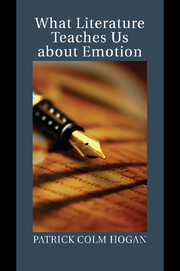Book contents
- Frontmatter
- Contents
- List of Figures
- Acknowledgments
- Introduction: Studying Literature Studying Emotion
- 1 Fictions and Feelings
- 2 What Emotions Are
- 3 Romantic Love
- 4 Grief
- 5 Mirth
- 6 Guilt, Shame, Jealousy
- 7 From Attachment to Ethical Feeling
- 8 Compassion and Pity
- Afterword: Studying Literature Shaping Emotion
- Works Cited
- Index
- Title in the series
5 - Mirth
From Chinese Jokes to The Comedy of Errors
Published online by Cambridge University Press: 03 May 2011
- Frontmatter
- Contents
- List of Figures
- Acknowledgments
- Introduction: Studying Literature Studying Emotion
- 1 Fictions and Feelings
- 2 What Emotions Are
- 3 Romantic Love
- 4 Grief
- 5 Mirth
- 6 Guilt, Shame, Jealousy
- 7 From Attachment to Ethical Feeling
- 8 Compassion and Pity
- Afterword: Studying Literature Shaping Emotion
- Works Cited
- Index
- Title in the series
Summary
Mirth is our response of delight to something we find comic. It is what happens when a phrase, action, or idea “tickles our funny bone.” The eliciting conditions of mirth include puns, pratfalls, silly costumes, goofy faces. The expressive outcomes include laughter, smiling, and in some cases a kind of groan plus wince plus grimace. The valence of the feeling is positive. In consequence, any actional outcomes are likely to aim at preserving rather than altering the situation (e.g., by encouraging a comic performer to continue). As to characteristic cognitive operations, it tends to be associated with what might loosely be called right-hemisphere processing, at least in the case of language – thus sensitivity to multiple meanings rather than the suppression of multiple meanings in the service of univocal understanding.
Most of us can probably recognize that there is an emotional response with these characteristics. Initially, however, it seems difficult to say just what could define this as an emotion system. Commonly, we begin our account of a given emotion system by reference to eliciting conditions. For example, consider fear. We feel fear when faced with wolves, bears, rats, snakes, muggers, the prospect of losing a job, the prospect of a loved one passing away, among other things. In themselves, wolves, muggers, a pink slip from one's employer, and a diagnosis from a doctor do not have much in common, but it is easy to see what makes them eliciting conditions for this emotion system.
- Type
- Chapter
- Information
- What Literature Teaches Us about Emotion , pp. 144 - 174Publisher: Cambridge University PressPrint publication year: 2011



